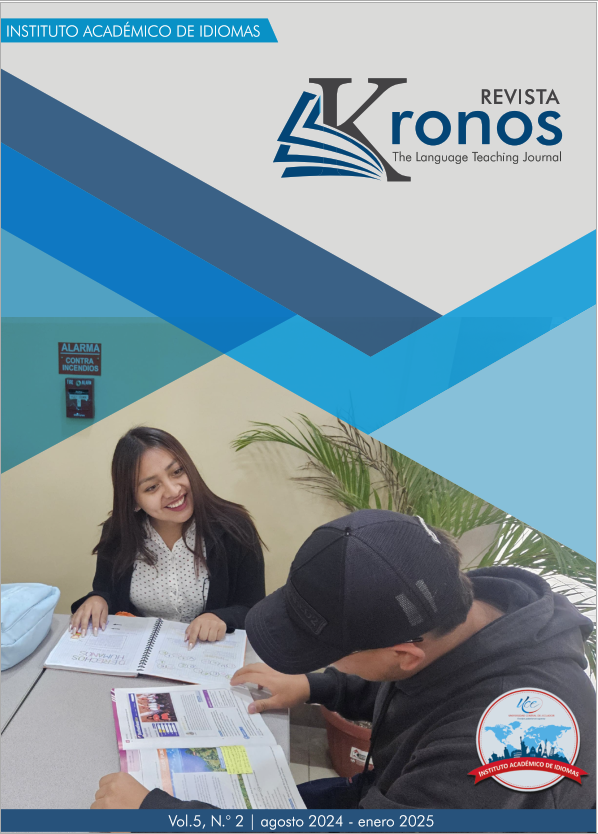La influencia de la evaluación por pares en la mejora de las habilidades orales en estudiantes B1
DOI:
https://doi.org/10.29166/kronos.v5i2.6801Palabras clave:
Evaluación de pares, Habilidades orales, Fluidez, Inglés como idioma extranjeroResumen
Este estudio de investigación explora cómo la evaluación de pares mejora las habilidades orales de estu diantes de inglés de nivel B1. Los participantes de este estudio son estudiantes universitarios quienes previamente estudiaron en una academia de Idiomas en Samborondón. El presente proyecto fue llevado a cabo en modalidad en línea, en un periodo de cuatro semanas, teniendo una clase de cuatro horas cada semana. Este estudio está diseñado por el análisis de la mejora de las habilidades orales de estudiantes a través del uso de la técnica de evaluación de pares, mediante la implementación de un pre y post test. El propósito de este estudio es responder a las preguntas: 1. ¿En qué medida mejora el uso de la evaluación de pares las habilidades orales de estudiantes de nivel B1? 2. ¿Cuáles son las perspectivas de los estudiantes acerca de la evaluación de pares y sus habilidades orales? La investigación reveló que la evaluación de pares sí influye significativamente en las destrezas orales de estudiantes de nivel B1, ya que sus puntajes en el post test se elevaron y mejoraron algunos factores como el uso de gramática y la pronunciación. Por lo tanto, este estudio debería servir como guía a docentes cuyo objetivo sea que sus estudiantes alcancen fluidez en inglés
Descargas
Citas
Alfonso, E. (2021). The importance of teaching English pronunciation in Spanish schools. Universidad de la Laguna Repository, 2-4. http://riull.ull.es/xmlui/handle/915/22905
Avison, D., Lau, F., Myers, M. and Nielsen, P.A. (1999). Action research. Communications of the ACM, 42(1), 94-97. https://doi.org/10.1145/291469.291479 DOI: https://doi.org/10.1145/291469.291479
Brown, G. (2015). Self and peer assessment. Assessment & Grading Seminar Series. http://hdl.handle.net/2292/28140
Caicedo Álvarez, O. A. (2016). The effects of peer-correction and peer-assessment on students’ spoken fluency (Master's thesis, Universidad de La Sabana). http://hdl.handle.net/10818/25057
Divjak, B., & Maretic, M. (2017). Learning Analytics for Peer-assessment: Disadvantages, Reliability and Implementation. JIOS, 4(1), 21-31. https://doi.org/10.31341/jios.41.1.2 DOI: https://doi.org/10.31341/jios.41.1.2
Fauzan, U. (2014). The use of improvisation technique to improve the speaking ability of EFL students. DINAMIKA ILMU, 14(2), 264-270 https://doi.org/10.21093/di.v14i2.17 DOI: https://doi.org/10.21093/di.v14i2.17
Hasnani, H., & Mubarak, H. (2020). The use of peer-Assessment in enhancing ESP students' speaking ability. Ethical Lingua: Journal of Language Teaching and Literature, 7(1), 74-81. https://doi.org/10.30605/25409190.135 DOI: https://doi.org/10.30605/25409190.135
Hyoung, S. (2016). Self- and peer- assessment of speaking. Studies in Applied Linguistics and TESOL, 16(2), 69-76. https://doi.org/10.7916/salt.v16i2.1257
Jambari, O., Khaerina, R., Siswanto, P., Nugroho, A., Nehe, B., Nurhayati, N., & Cahyono, H. (2021). The correlation between students' vocabulary mastery and students' speaking skill. Atlantis Press, 535, 102-104. 10.2991/assehr.k.210304.023 DOI: https://doi.org/10.2991/assehr.k.210304.023
Leong, L.-M., & Ahmadi, S. M. (2017). An analysis of factors influencing learners' English-speaking skill. International Journal of Research in English Education, 2(1), 34-41. https://doi.org/10.18869/acadpub.ijree.2.1.34 DOI: https://doi.org/10.18869/acadpub.ijree.2.1.34
Li, J., Huang, J., & Cheng, S. (2022). The reliability, effectiveness, and benefits of peer assessment in college EFL speaking classrooms: Student and teachers’ perspectives. Studies in Educational Evaluation, 72, 101-120. https://doi.org/10.1016/j.stueduc.2021.101120 DOI: https://doi.org/10.1016/j.stueduc.2021.101120
Meletiadou, E. (2021). Exploring the impact of peer-assessment on EFL students' writing performance. IAFOR Journal of Education: Language Learning in Education, 9(3), 80-81. https://eric.ed.gov/?id=EJ1302975 DOI: https://doi.org/10.22492/ije.9.3.05
Ministerio de Educacion. (2019). National English curriculum guidelines. lengua-extranjera/
Musfirah, Y. (2019). The use of peer-assessment in speaking skill. English Education Journal, 10(1), 68-76. https://jurnal.usk.ac.id/EEJ/article/view/13257
Ndoye, A. (2017). Peer/self-assessment and student leaning. International Journal of Teaching and Learning in Higher Education, 29(2), 255-269. https://eric.ed.gov/?id=EJ1146193
Oviedo, N., & Mena, J. (2021). Communicative language teaching approach in the development of speaking skill. Ciencia Digital, 5(4), 6-26. https://doi.org/10.33262/cienciadigital.v5i4.1865 DOI: https://doi.org/10.33262/cienciadigital.v5i4.1865
Power, J. R., & Tanner, D. (2023). Peer assessment, self-assessment, and resultant feedback: an examination of feasibility and reliability. European Journal of Engineering Education, 48(4), 615-628. https://doi.org/10.1080/03043797.2023.2185769 DOI: https://doi.org/10.1080/03043797.2023.2185769
Prastika, A. (2020). The use of peer-assessment technique to improve speaking performance of junior high school students of Gula Putih Mataram in academic year 2019/2020. Mataram. https://repository.metrouniv.ac.id/id/eprint/1488
Quimi, S. (2024). The influence of formative peer-assessment to develop speaking fluency for EFL students. http://dspace.casagrande.edu.ec:8080/handle/ucasagrande/4583
Rao, P. S. (2019). The importance of speaking skills in English classroom. Alford Council of International English & Literature Journal, 2(2), 6-18. https://www.researchgate.net/publication/334283040_THE_IMPORTANCE_OF_SPEAKING_SKILLS_IN_ENGLISH_CLASSROOMS
Samouni, A. (2023). Peer-assessment of the writing skill in the Moroccan EFL context: The attitudes and perceptions of students and teachers at Sultan Moulay Slimane University as a case study. Research Gate.
http://dx.doi.org/10.13140/RG.2.2.27256.42242
Seifert, T., & Feliks, O. (2019). Online self-assessment and peer-assessment as a tool to enhance student-teachers' assessment skills. Assessment & Evaluation in Higher Education, 44(2), 169-185. https://doi.org/10.1080/02602938.2018.1487023 DOI: https://doi.org/10.1080/02602938.2018.1487023
Sevy-Biloon, J., Cajamarca, T., & Avila, A. (2023). Enhancing comprehension and motivation in lower level Ecuador EFL students: An action research study of three reading strategies at UNAE. European Journal of Foreign Language Teaching, 7(2), 103-104. http://dx.doi.org/10.46827/ejfl.v7i2.4992 DOI: https://doi.org/10.46827/ejfl.v7i2.4992
Stancic, M. (2021). Peer assessment as a learning and self-assessment tool: a look inside the black box. Assessment & Evaluation in Higher Education, 46(6), 852-864. https://doi.org/10.1080/02602938.2020.1828267 DOI: https://doi.org/10.1080/02602938.2020.1828267
Tarigan, K., & Stevani, M. (2022). English teachers' beliefs in teaching grammar to improve students' speaking skill. Journal of English Language and Education, 22(1), 131-132.
https://www.jele.or.id/index.php/jele/article/view/236
White, E. (2009). Students’ perspective of peer Assessment for learning in a public speaking course. Asian EFL Journal, 33(1), 1-36. http://asian-efl-journal.com/pta_January_09.pdf.
Yan, Z., Lao, H., Panadero, E., Fernandez, B., Yang, L., & Yang, M. (2022). Effects of self-assessment and peer-assessment interventions on academic performance: A meta-analysis. Educational Research Review, 37, 3-4. https://doi.org/10.1016/j.edurev.2022.100484 DOI: https://doi.org/10.1016/j.edurev.2022.100484
Zhussupova, R., & Shadiev, R. (2023). Digital storytelling to facilitate academic public speaking skills: case study in culturally diverse multilingual classroom. Journal of Computers in Education, 10(3), 499-526. https://doi.org/10.1007/s40692-023-00259-x DOI: https://doi.org/10.1007/s40692-023-00259-x
Publicado
Cómo citar
Número
Sección
Licencia
Derechos de autor 2025 Dayana Torres

Esta obra está bajo una licencia internacional Creative Commons Atribución-NoComercial-CompartirIgual 4.0.












